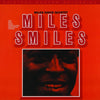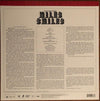





Miles Davis - Miles Smiles (2LP, Ultra Analog, Half-speed Mastering, 45 RPM)
ORDER LIMITED TO ONE ITEM PER CUSTOMER
Miles Davis, trumpet [click here to see more vinyl featuring Miles Davis]
Wayne Shorter, tenor saxophone [click here to see more vinyl featuring Wayne Shorter]
Herbie Hancock, piano [click here to see more vinyl featuring Herbie Hancock]
Ron Carter, bass [click here to see more vinyl featuring Ron Carter]
Tony Williams, drums
Written by Wayne Shorter (A1, B1, C1), Miles Davis (A2), Eddie Harris (C2), Jimmy Heath (D1)
2 LPs, gatefold sleeve
Limited to 4,000 numbered copies
Original analog Master tape : YES
Half-speed Mastering
Gain 2™ Ultra Analog
Heavy Press : 180g
Record color : black
Speed : 45RPM
Size : 12”
Stereo
Studio
Record Press : RTI
Label : MOFI
Original Label : Columbia
Recorded October 24–October 25, 1966 at Columbia 30th Street Studio, New York City
Engineered by Frank Laico
Produced by Teo Macero
Remastered by Krieg Wunderlich, Shawn R. Britton
Originally released in 1967
Reissued in 2019
Tracks:
Side A:
- Orbits
- Circle
Side B:
- Footprints
Side C:
- Dolores
- Freedom Jazz Dance
Side D:
- Ginger Bread Boy
Reviews :
"With their second album, Miles Smiles, the second Miles Davis Quintet really began to hit their stride, delving deeper into the more adventurous, exploratory side of their signature sound. This is clear as soon as "Orbits" comes crashing out the gate, but it's not just the fast, manic material that has an edge -- slower, quieter numbers are mercurial, not just in how they shift melodies and chords, but how the voicing and phrasing never settles into a comfortable groove. This is music that demands attention, never taking predictable paths or easy choices. Its greatest triumph is that it masks this adventurousness within music that is warm and accessible -- it just never acts that way. No matter how accessible this is, what's so utterly brilliant about it is that the group never brings it forth to the audience. They're playing for each other, pushing and prodding each other in an effort to discover new territory. As such, this crackles with vitality, sounding fresh decades after its release. And, like its predecessor, ESP, this freshness informs the writing as well, as the originals are memorable, yet open-ended and nervy, setting (and creating) standards for modern bop that were emulated well into the new century. Arguably, this quintet was never better than they are here, when all their strengths are in full bloom.
Ultra Analog™ : The GAIN 2 Ultra Analog™ Series stems from the use of the Gain 2 system, mastered at half speed from the original master tapes where possible, capturing and uncovering as before undiscovered sonic information.
Half-speed mastering. In half-speed mastering, the whole process is slowed down to half of the original speed. A typical 33 1/3 rpm record is cut at 16 2/3 rpm. The source material is also slowed down (reducing the pitch in the process) meaning the final record will still sound normal when played back. Slowing the whole process down allows more time, which means the end result sounds better and is more efficient — allowing engineering to minimize the effects of inherent limitations within the vinyl format. The result is a more accurate and more open high-frequency response in the half speed vinyl when compared with a normal speed recording.
Ratings :
AllMusic : 5 / 5 , Discogs : 4,6 / 5

